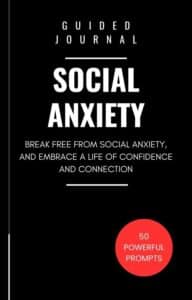In a world that thrives on constant connection and social interaction, it’s no wonder that social anxiety has become an all too familiar companion for many. The fear of judgment, the unease in social settings, and the overwhelming self-consciousness can turn even the simplest of interactions into a Herculean task. But what if there was a way to navigate through this maze of anxiety and find a path to self-discovery and growth?
Enter journaling – a powerful tool that allows you to delve deep into your thoughts, emotions, and experiences in a safe and private space. By putting pen to paper, you can unravel the complexities of social anxiety, challenge your limiting beliefs, and cultivate a sense of empowerment.
And to aid you on this transformative journey, we present to you 50 thought-provoking journal prompts specifically designed to tackle social anxiety head-on.
These prompts will take you on a voyage of self-reflection, helping you explore the roots of your anxiety, identify triggers, and develop strategies to overcome them. From examining childhood experiences to envisioning a more confident future, each prompt is crafted to elicit profound insights and ignite personal growth.
So, grab a pen, find a cozy corner, and let the healing power of journaling guide you towards a life free from the shackles of social anxiety.
Understanding Social Anxiety: Overcoming the Fear of Social Interaction
What is Social Anxiety?
Social anxiety, also known as social phobia, is an intense fear of social situations and the scrutiny of others. It is characterized by an overwhelming worry about being judged, embarrassed, or humiliated in social interactions. People with social anxiety often experience a deep sense of self-consciousness and a fear of being negatively evaluated by others, leading to avoidance or distress in various social situations.
Symptoms of Social Anxiety
Physical Symptoms:
- Rapid heartbeat and palpitations
- Sweating and trembling
- Shortness of breath or feeling suffocated
- Upset stomach or nausea
- Muscle tension and shaking
Emotional Symptoms:
- Intense fear or dread before and during social interactions
- Excessive worry about embarrassing oneself
- Fear of being the center of attention
- Persistent self-consciousness
- Low self-esteem and feelings of inadequacy
Impact of Social Anxiety
Social anxiety can significantly impact various aspects of an individual’s life, including:
Relationships:
- Difficulty initiating and maintaining friendships
- Fear of public speaking or performing in front of others
- Avoidance of social events or parties
Education and Career:
- Fear of speaking up in class or participating in group activities
- Avoidance of job interviews or professional networking opportunities
- Impaired performance due to anxiety and self-doubt
Everyday Life:
- Avoidance of public places, such as restaurants or crowded areas
- Difficulty making phone calls or ordering food
- Fear of judgment and scrutiny in everyday interactions
Examples of Social Anxiety
Let’s explore a few relatable examples to illustrate how social anxiety can manifest in everyday situations:
Meeting New People:
- Feeling nervous and anxious at social gatherings or parties
- Struggling to start conversations or join group discussions
- Overanalyzing past interactions and worrying about making a good impression
Public Speaking:
- Experiencing intense fear and anxiety before giving a presentation
- Physical symptoms such as trembling, sweating, and a racing heart
- Avoiding opportunities that involve public speaking or presentations
Performance Anxiety:
- Feeling overwhelmed and anxious before auditions or performances
- Fear of making mistakes or being judged by the audience
- Difficulty concentrating and performing to one’s full potential
Overcoming Social Anxiety
While social anxiety can be challenging, it is possible to overcome it with the right strategies and support. Here are a few helpful techniques:
Cognitive-Behavioral Therapy (CBT):
- A therapeutic approach that helps individuals challenge and reframe negative thoughts and beliefs about social situations.
- Teaches practical skills for managing anxiety, such as deep breathing exercises and gradual exposure to feared situations.
Medication:
- In some cases, medication prescribed by a healthcare professional can help alleviate the symptoms of social anxiety.
- Antidepressants and anti-anxiety medications are commonly used to manage social anxiety.
Support Network:
- Seeking support from understanding friends, family, or support groups can provide a sense of validation and encouragement.
- Sharing experiences with others who have faced similar challenges can be empowering and help reduce feelings of isolation.
Social anxiety is a common condition that can significantly impact an individual’s life, relationships, and overall well-being. By understanding social anxiety and its symptoms, we can foster empathy and create supportive environments for those who experience it.
Remember, overcoming social anxiety is a journey that requires patience, self-compassion, and the right support. With time and the appropriate strategies, individuals with social anxiety can lead fulfilling lives and engage in social interactions with confidence.

Unleash the Power of Journaling: Transforming Social Anxiety One Page at a Time
Welcome to the world of journaling – a powerful tool that holds the key to unlocking your potential and overcoming social anxiety. In this chapter, we will explore the transformative benefits of journaling and how it can empower you to conquer your fears, enhance your self-awareness, and cultivate a deeper sense of connection with yourself and others.
What is Journaling?
Journaling is the practice of writing down your thoughts, feelings, and experiences in a private and reflective manner. It serves as a safe space for self-expression, self-reflection, and self-discovery. While the act of journaling itself may seem simple, its impact can be profound.
Understanding Social Anxiety
Social anxiety is a common mental health condition characterized by an intense fear of social interactions and a constant worry of being judged or humiliated by others. It can significantly impact your quality of life, making everyday situations, such as speaking in public or attending social gatherings, seem daunting and overwhelming.
How Journaling Transforms Social Anxiety
Self-Exploration and Awareness:
Journaling provides a unique opportunity to explore and understand the roots of your social anxiety. Through writing, you can delve into your deepest thoughts and emotions, uncovering patterns, triggers, and underlying beliefs that contribute to your anxiety. This newfound self-awareness is the first step towards healing and growth.
Emotional Release and Catharsis:
Expressing your emotions through journaling can be incredibly cathartic. By putting your thoughts and feelings onto paper, you release the emotional weight you carry within, allowing for a sense of relief and liberation. This process helps you gain perspective and distance from your anxiety, making it less overwhelming.
Challenging Negative Thought Patterns:
Journaling enables you to challenge and reframe negative thought patterns associated with social anxiety. By objectively examining your thoughts and beliefs, you can identify cognitive distortions and replace them with more realistic and positive perspectives. This shift in mindset empowers you to approach social situations with greater confidence and optimism.
Identifying Triggers and Coping Strategies:
Through journaling, you can identify specific triggers that intensify your social anxiety. By recognizing these triggers, you can develop effective coping strategies and action plans to manage them. Journaling also allows you to track your progress over time, highlighting the strategies that work best for you.
Building Self-Compassion and Acceptance:
Journaling fosters self-compassion and self-acceptance by providing a non-judgmental space for self-reflection. As you write, you can cultivate a kind and compassionate inner voice that counteracts the harsh self-criticism often associated with social anxiety. This self-compassion lays the foundation for personal growth and resilience.
Tips for Effective Journaling
Find a Safe and Private Space:
Choose a quiet and comfortable space where you can write without distractions. Ensure your journal is kept private to maintain a sense of security and confidentiality.
Set Aside Regular Time:
Commit to a regular journaling practice. Whether it’s daily, weekly, or as needed, consistency is key to reaping the benefits of journaling.
Be Honest and Authentic:
Write freely and honestly, without censoring yourself. Allow your thoughts and emotions to flow onto the pages without judgment. Remember, this is your personal space for self-expression.
Experiment with Different Styles:
Explore different journaling styles, such as free writing, prompts, bullet points, or even artistic expression through drawings or collages. Find what resonates with you and adapt your approach accordingly.
Reflect and Review:
Periodically review your journal entries to observe patterns, track progress, and celebrate milestones. This reflection allows you to witness your growth and provides valuable insights for your continued journey.
Journaling is a transformative practice that holds the power to liberate you from the shackles of social anxiety. By embarking on this journey of self-discovery, self-expression, and self-compassion, you can rewrite your narrative and step into a world where social interactions become opportunities for growth, connection, and joy.
Embrace the pen, unleash your inner voice, and watch as journaling becomes your companion on the path to social anxiety transformation.

Journal Writing Prompts for Social Anxiety
Write a letter to your younger self, offering advice and support for navigating social anxiety.
Imagine a world where social anxiety didn’t exist. Describe how this would change your life and the lives of those around you.
If social anxiety had a physical form, what would it look like? Draw or describe its appearance and characteristics.
Think about a recent social situation that triggered your anxiety. Write about what happened, how you felt, and how you could have responded differently.
Write a short story about a character who overcomes their social anxiety and finds true connection with others.
Make a list of five small steps you can take to gradually face and overcome your social anxiety.
Create a vision board of images and words that represent your ideal social life. Reflect on how you can work towards making that vision a reality.
Write a poem that captures the emotions and sensations of being in a room full of people while experiencing social anxiety.
Describe a time when someone’s understanding and acceptance helped ease your social anxiety. How did their actions impact you?
Imagine you have a magical object that can instantly boost your confidence in social situations. What does it look like, and how does it make you feel?
Write a dialogue between your anxious self and your confident self. Explore the differences in how they perceive social situations.
Reflect on a time when you surprised yourself by successfully navigating a social event despite your anxiety. What strategies did you use?
Describe a safe space where you feel completely at ease and free from social anxiety. What makes this place special and comforting to you?
Write a letter to a close friend or family member, explaining the challenges you face with social anxiety and how they can support you.
Create a playlist of songs that resonate with your experience of social anxiety. Write about why each song is meaningful to you.
Imagine you are hosting a support group for individuals with social anxiety. Write an invitation letter, describing what participants can expect and how it will benefit them.
Write a short story from the perspective of someone who doesn’t understand social anxiety. How can they learn to empathize and support those who experience it?
Describe a fictional character who embodies resilience and courage in the face of social anxiety. How can you draw inspiration from their story?
Reflect on the role of social media in exacerbating or alleviating social anxiety. How can you use it in a way that promotes your well-being?
Write a list of affirmations specifically tailored to combat social anxiety. Repeat them to yourself daily and reflect on how they make you feel.
Imagine attending a social event where everyone else is also experiencing social anxiety. How does this change your perspective and ease your nerves?
Write a dialogue between your social anxiety and your inner strength. Explore how they interact and influence your thoughts and actions.
Reflect on a time when you felt accepted and included despite your social anxiety. What factors contributed to that positive experience?
Create a self-care routine that specifically targets the symptoms and triggers of your social anxiety. Describe each step and the impact it has on your well-being.
Write a poem that compares social anxiety to a wild animal. Explore the ways in which it can be tamed and understood.
Imagine you have the ability to see the invisible thoughts and worries that others carry in social situations. How does this change your perspective on social anxiety?
Reflect on the role of self-compassion in managing social anxiety. How can you cultivate a kind and understanding attitude towards yourself?
Write a letter to a fictional character who also struggles with social anxiety. Offer them advice and encouragement based on your own experiences.
Describe a social situation that brings you joy and excitement. How can you incorporate elements of that experience into other challenging social contexts?
Write a short story about a group of diverse individuals who come together to support each other in overcoming their social anxiety.
Reflect on the impact of negative self-talk on your social anxiety. Write a letter to your inner critic, challenging its destructive beliefs.
Imagine you are a social anxiety coach. Write a blog post outlining practical strategies and exercises for managing and overcoming social anxiety.
Describe a fictional potion or elixir that can temporarily alleviate social anxiety. What ingredients does it contain, and how does it work?
Reflect on the cultural and societal factors that contribute to the prevalence of social anxiety. How can awareness and understanding of these factors help reduce stigma?
Write a letter to a future version of yourself who has successfully overcome social anxiety. Describe the journey and the lessons learned along the way.
Imagine you are the protagonist of a novel dealing with social anxiety. Write the opening scene, capturing the essence of your character’s struggles and aspirations.
Reflect on the role of vulnerability in building meaningful connections despite social anxiety. How can you embrace vulnerability as a strength?
Write a poem that explores the beauty and strength that can emerge from navigating social anxiety.
Describe a supportive and understanding social environment that would help ease your anxiety. What qualities and dynamics would be present in this ideal setting?
Imagine you have the power to eradicate social anxiety from the world. Reflect on the potential consequences and challenges that may arise from this change.
Write a dialogue between your social anxiety and your inner child. How can you nurture and comfort your inner child in social situations?
Reflect on the ways in which social anxiety has shaped your character and perspective on life. What strengths have you developed as a result?
Describe a metaphorical journey through a labyrinth, representing the challenges and triumphs of navigating social anxiety.
Write a letter to a fictional character who serves as a role model for managing social anxiety. Thank them for their inspiration and share what you’ve learned from them.
Reflect on the impact of physical exercise on your social anxiety. Describe the positive changes you’ve noticed and how you can incorporate exercise into your routine.
Imagine you are a superhero with the ability to transform social situations to fit your comfort level. How does this alter your experience of social anxiety?
Describe a social activity or hobby that brings you joy and allows you to express yourself authentically. How can you incorporate more of this into your life?
Write a letter to your future self, expressing hope and optimism for a life free from the constraints of social anxiety.
Reflect on the ways in which social anxiety has influenced your perception of yourself and others. How can you challenge and reframe these beliefs?
Create a visualization exercise where you imagine yourself confidently navigating a challenging social situation. Describe the details and emotions you experience during this visualization.
Download Printable Journal Prompts (PDF) >>
Guided Journal for Social Anxiety
50 Powerful Writing Prompts to Break Free from Social Anxiety, and Embrace a Life of Confidence and Connection

Welcome to the Guided Journal for Social Anxiety, a powerful tool designed to help you conquer your fears, break free from the grip of social anxiety, and unlock your true potential. If you’ve ever felt the crippling fear of judgment, the paralyzing self-consciousness, or the overwhelming isolation that comes with social anxiety, this journal is your roadmap to a brighter future.
Your Path to Transformation
- Step-by-step process to conquer social anxiety, tailored specifically for you.
- Practical exercises, thought-provoking prompts, and guided reflections to help you challenge negative beliefs, build self-compassion, and develop effective coping strategies.
- Paint a compelling vision of the future you can create by embracing the tools and techniques within this guided journal.
- Explore the limitless possibilities that await you as you learn to navigate social situations with ease, form deep connections, and cultivate a strong sense of self-worth.
- Inspire hope and ignite the motivation to embark on this transformative journey towards a life free from the shackles of social anxiety
The Guided Journal for Social Anxiety is your trusted companion on the path to personal growth and liberation. It offers you an opportunity to break free from the constraints of social anxiety, step into your power, and rewrite your story. This journal is your key to unlocking a life of confidence, connection, and fulfillment. Don’t let social anxiety hold you back any longer – take the first step towards your transformation today.
As you reach the end of this journaling adventure, you may find yourself equipped with newfound self-awareness and a deeper understanding of your social anxiety. Through introspection and reflection, you have unraveled the intricate web of thoughts and emotions that have held you back for far too long. You have confronted your fears, challenged your beliefs, and embraced the possibility of change.
But remember, this is just the beginning. The journey towards overcoming social anxiety is an ongoing process, and journaling will continue to be your faithful companion. As you close this chapter, take a moment to appreciate the progress you have made and the strength you have discovered within yourself.
Now, as you step back into the world, armed with insight and resilience, we leave you with a final thought-provoking question: What steps will you take today to rewrite your narrative and create a life of confidence and connection?
The power lies within you, and with the aid of journaling, you have the tools to shape your own destiny. Embrace the challenge, embrace your growth, and watch as your journey unfolds before your very eyes.

